Fleurs du Mal Magazine


Or see the index

Monolietjes
Boven hun tijd zijn ze uitstekend gebleven, die
vele monoliedjes uit de transistorradio. Er was
geen stereo nog maar deze oren hoorden wel al
in een taal die ze verstonden hoe ze zouden blijven
hangen. Fijn afgedaald terug naar blij verlangen,
halsstarrig glanzend als muntjes in een fontein.
Bert Bevers
Monolietjes
Gedicht
Ongepubliceerd
• fleursdumal.nl magazine
More in: Archive A-B, Archive A-B, Bevers, Bert
A Washington Post Style editor’s fascinating and irresistible look back on the Miss America pageant as it approaches its 100th anniversary.
 The sash. The tears. The glittering crown. And of course, that soaring song. For all of its pomp and kitsch, the Miss America pageant is indelibly written into the American story of the past century.
The sash. The tears. The glittering crown. And of course, that soaring song. For all of its pomp and kitsch, the Miss America pageant is indelibly written into the American story of the past century.
From its giddy origins as a summer’s-end tourist draw in Prohibition-era Atlantic City, it blossomed into a televised extravaganza that drew tens of millions of viewers in its heyday and was once considered the highest honor that a young woman could achieve.
For two years, Washington Post reporter and editor Amy Argetsinger visited pageants and interviewed former winners and contestants to unveil the hidden world of this iconic institution.
There She Was spotlights how the pageant survived decades of social and cultural change, collided with a women’s liberation movement that sought to abolish it, and redefined itself alongside evolving ideas about feminism.
For its superstars—Phyllis George, Vanessa Williams, Gretchen Carlson—and for those who never became household names, Miss America was a platform for women to exercise their ambitions and learn brutal lessons about the culture of fame. Spirited and revelatory, There She Was charts the evolution of the American woman, from the Miss America catapulted into advocacy after she was exposed as a survivor of domestic violence to the one who used her crown to launch a congressional campaign; from a 1930s winner who ran away on the night of her crowning to a present-day rock guitarist carving out her place in this world. Argetsinger dissects the scandals and financial turmoil that have repeatedly threatened to kill the pageant—and highlights the unexpected sisterhood of Miss Americas fighting to keep it alive.
Amy Argetsinger is an editor and writer for The Washington Post. “There She Was” is her first book.
There She Was:
The Secret History of Miss America
by Amy Argetsinger
Publisher: Atria/One Signal Publishers
September 7, 2021
Language : English
Hardcover : 384 pages
ISBN-10 : 1982123397
ISBN-13 : 978-1982123390
$ 23.49
• fleursdumal.nl magazine
More in: - Book News, - Book Stories, Archive A-B, AUDIO, CINEMA, RADIO & TV, NONFICTION: ESSAYS & STORIES, PRESS & PUBLISHING
New and selected poets from the
great Pulitzer Prize–winning poet
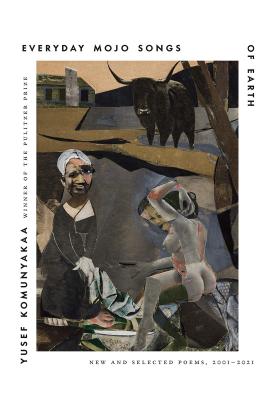
Everyday Mojo Songs of Earth brings together selected poems from the past twenty years of Yusef Komunyakaa’s work, as well as new poems from the Pulitzer Prize winner.
Komunyakaa’s masterful, concise verse conjures arresting images of peace and war, the natural power of the earth and of love, his childhood in the American South and his service in Vietnam, the ugly violence of racism in America, and the meaning of power and morality.
The new poems in this collection add a new refrain to the jazz-inflected rhythms of one of our “most significant and individual voices” (David Wojahn, Poetry).
Komunyakaa writes of a young man fashioning a slingshot, workers who “honor the Earth by opening shine / inside the soil,” and the sounds of a saxophone filling a dim lounge in New Jersey. As April Bernard wrote in The New York Times Book Review, “He refuses to be trivial; and he even dares beauty.”
These songs run along dirt roads
& highways, crisscross lonely seas
& scale mountains, traverse skies
& underworlds of neon honkytonk,
Wherever blues dare to travel.
Yusef Komunyakaa (born James William Brown, April 29, 1941) is an American poet who teaches at New York University and is a member of the Fellowship of Southern Writers. Komunyakaa is a recipient of the 1994 Kingsley Tufts Poetry Award, for Neon Vernacular and the 1994 Pulitzer Prize for Poetry. He also received the Ruth Lilly Poetry Prize. Komunyakaa received the 2007 Louisiana Writer Award for his enduring contribution to the poetry world. His subject matter ranges from the black experience through rural Southern life before the Civil Rights era and his experience as a soldier during the Vietnam War.
Everyday Mojo Songs of Earth:
New and Selected Poems, 2001-2021
by Yusef Komunyakaa
Publisher: Farrar, Straus and Giroux
(June 15, 2021)
Language: English
288 pages
ISBN-10 : 0374600139
ISBN-13 : 978-0374600136
Hardcover $25.60
Paperback $18.00
• fleursdumal.nl magazine
More in: #Editors Choice Archiv, - Book News, - Bookstores, Archive K-L, Archive K-L, Black Lives Matter
BANNED BOOKS WEEK
September 26 – October 2 for the 2021
celebration of the right to read!

Across the United States, divisive book bans and censorious threats have taken hold in schools, academia, and the public square, particularly in regards to books that center racism, history, and diversity. This has raised questions: Who is allowed to be heard? Who decides? This year, as we celebrate Banned Books Week, PEN America uplifts the books, authors, teachers, and writers who insist on telling stories and examining history with truth, honesty, and complexity.
In an effort to unpack these current challenges, PEN America is hosting a series of virtual and in-person events. These events will offer a clear-eyed view of the current assaults on the freedom to express, the freedom to read, and the freedom to learn.
Join PEN America Today
Defend free expression, support persecuted writers, and promote literary culture.
Read more about what PEN America is doing to fight back against book bans during 2021 Banned Books Week.

BANNED BOOKS WEEK
September 26 – October 2 for the 2021
celebration of the right to read!
Banned Books Week is the annual celebration of the freedom to read. The event is sponsored by a coalition of organizations dedicated to free expression, including American Booksellers Association; American Library Association; American Society of Journalists and Authors; Association of University Presses; Authors Guild; Comic Book Legal Defense Fund; Foundation for Individual Rights in Education (FIRE); Freedom to Read Foundation; Index on Censorship; National Coalition Against Censorship; National Council of Teachers of English; PEN America; People For the American Way Foundation; and Project Censored. It is endorsed by the Center for the Book in the Library of Congress. Banned Books Week also receives generous support from DKT Liberty Project and Penguin Random House.
Read more about the 2021 Banned Books Week.
→ https://bannedbooksweek.org/
• fleursdumal.nl magazine
More in: - Bookstores, Art & Literature News, Banned Books, DICTIONARY OF IDEAS, Literary Events, PEN Actions, PRESS & PUBLISHING, Racism, REPRESSION OF WRITERS, JOURNALISTS & ARTISTS
Die »Münchhausiade« von Karl Leberecht Immermann steht in einer langen Tradition: Sie ist die groteske Variante der Ur-Münchhausen-Legende aus dem 18. Jahrhundert, die von den Kriegs-, Jagd- und Reiseabenteuern des volkstümlichen Freiherrn von Münchhausen auf Bodenwerder fabuliert.

Immermann verwandelt die phantastischen Legenden des berühmten »Lügenbarons« zu einer in der deutschen Literatur bis dahin unbekannten Form des Romans: zeithistorisch, gesellschaftskritisch, komisch und scharf-satirisch, eine anspielungsreiche, schillernde Verbindung aus Zeit- und Kulturkritik. Immermanns Münchhausen erneuert den Roman seiner Zeit und ist eines der bedeutendsten epischen Werke der deutschen Literatur.
Karl Leberecht Immermann, heute fast vergessen, nimmt Abschied vom Bildungs- und Erziehungsroman der klassischen und romantischen Literatur. 1838/39 erschienen und nicht nur von Heinrich Heine bewundert, ist sein origineller Münchhausen eine virtuos verschlungene »Geschichte in Arabesken«.
Bei Immermann ist Münchhausen ein »Erzwindbeutel«, ein »Cäsar der Lügen« und ein »Don Juan der Erfindung « – einer, der in seinem Tun und Erzählen die Wahrheit beansprucht und den Leser, angesprochen und immer wieder ins Geschehen einbezogen, zur Wahrheitsfindung auffordert. Laurence Sternes komischer Roman Tristram Shandy ist dabei das große, vom Erzähler herbeizitierte Vorbild.
Münchhausen ist zugleich ein Doppelroman, der auch vom »Oberhof«, einem reichen westfälischen Gutshof, und vom Kosmos der damaligen ländlichen Lebenswelt erzählt; im Zentrum der »Hofschulze« und ein »Jäger Oswald« – die Gegenwelt zur verfallenden Welt des Adels, in der der Münchhausen-Enkel und sein Diener Karl Buttervogel vor dem Herrn von »Schloss Schnick-Schnack-Schnurr«, vor Tochter und Dorfschulmeister schwadronieren. Eingebunden wird das ausschweifende Geschehen in eine Ehe- und Liebesgeschichte, erzählt werden die ineinander verschlungenen Welten in einem Zeitraum von wenigen Wochen.
Und was bedeutet es, wenn Immermann von einer »Geschichte in Arabesken« spricht? »… wer dabei den Verstand behalten will, der muss einen weniger geordneten Kopf haben, als ich leider besitze. Herr von Münchhausen beginnen zu erzählen; dann fangen wieder andere Personen an, in diesen Erzählungen zu erzählen; wenn man nicht schleunigst Einhalt tut, so geraten wir wahrhaftig in eine Untiefe des Erzählens hinein, worin unser Verstand notwendig Schiffbruch leiden muss. Bei den Frauen, die mit Schachteln handeln, stecken oft vierundzwanzig ineinander …«
Karl Leberecht Immermann (1796–1840) studierte Rechtswissenschaft, pflegte literarische Interessen, nahm an den napoleonischen Kriegen teil und wurde 1818 Gerichtsreferendar in Magdeburg. In dieser Zeit schreibt er seine ersten Dramen, es folgen ein Roman, Gedichte und Trauerspiele. Als Landgerichtsrat geht er nach Düsseldorf und übernimmt die Leitung des Düsseldorfer Theaters. 1836 erscheinen Die Epigonen. Familienmemoiren in neun Büchern und 1838/39 Münchhausen. Eine Geschichte in Arabesken.
Karl Leberecht Immermann
Münchhausen.
Eine Geschichte in Arabesken
2021
Seitenanzahl: 852
Originalausgaben
Bandnummer: 435
Mit ausführlichen Anmerkungen und einem Nachwort von Tilman Spreckelsen. Originalausgabe, nummeriert und limitiert, Sondernummer zum Sonderpreis. Fadenheftung mit Lesebändchen, Dünndruckpapier. Umschlaggestaltung: Ute Henkel, Berlin
ISBN: 9783847704355
52,00 EUR
• fleursdumal.nl magazine
More in: - Book Lovers, - Book Stories, Archive I-J, Münchhausen, Tales of Mystery & Imagination
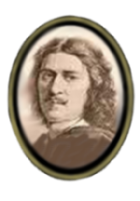
La débauche
(extrait)
Bacchus ! qui vois notre débauche,
Par ton saint portrait que j’ébauche
En m’enluminant le museau
De ce trait que je bois sans eau ;
Par ta couronne de lierre,
Par la splendeur de ce grand verre,
Par ton thyrse tant redouté,
Par ton éternelle santé,
Par l’honneur de tes belles fêtes,
Par tes innombrables conquêtes,
Par les coups non donnés, mais bus,
Par tes glorieux attributs,
Par les hurlements des Ménades,
Par le haut goût des carbonnades,
Par tes couleurs blanc et clairet,
Par le plus fameux cabaret,
Par le doux chant de tes orgies,
Par l’éclat des trognes rougies,
Par table ouverte à tout venant,
Par les fins mors de ta cabale,
Par le tambour et la cymbale,
Par tes cloches qui sont des pots,
Par tes soupirs qui sont des rots,
Par tes hauts et sacrés mystères,
Par tes furieuses panthères,
Par ce lieu si frais et si doux,
Par ton bouc, paillard comme nous,
Par ta grosse garce Ariane,
Par le vieillard monté sur l’âne,
Par les satyres, tes cousins,
Par la fleur des plus beaux raisins,
Par ces bisques si renommées,
Par ces langues de boeuf fumées,
Par ce tabac, ton seul encens,
Par tous les plaisirs innocents,
Par ce jambon couvert d’épice,
Par ce long pendant de saucisse,
Par la majesté de ce broc,
Par masse, tope, cric et croc,
Par cette olive que je mange,
Par ce gai passeport d’orange,
Par ce vieux fromage pourri,
Bref par Gillot, ton favori,
Reçois-nous dans l’heureuse troupe,
Des francs chevaliers de la coupe,
Et, pour te montrer tout divin,
Ne la laisse jamais sans vin.
Marc-Antoine Girard de Saint-Amant
(1594 – 1661)
La débauche
(extrait)
• fleursdumal.nl magazine
More in: # Classic Poetry Archive, Archive G-H, Archive S-T, Archive S-T
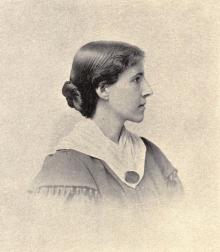
“We as women”
There’s a cry in the air about us–
We hear it before, behind–
Of the way in which “We, as women,”
Are going to lift mankind!
With our white frocks starched and ruffled,
And our soft hair brushed and curled–
Hats off! for “We, as women,”
Are coming to save the world.
Fair sisters, listen one moment–
And perhaps you’ll pause for ten:
The business of women as women
Is only with men as men!
What we do, “We, as women,”
We have done all through our life;
The work that is ours as women
Is the work of mother and wife.
But to elevate public opinion,
And to lift up erring man,
Is the work of the Human Being;
Let us do it–if we can.
But wait, warm-hearted sisters–
Not quite so fast, so far.
Tell me how we are going to lift a thing
Any higher than we are!
We are going to “purify politics,”
And to “elevate the press.”
We enter the foul paths of the world
To sweeten and cleanse and bless.
To hear the high things we are going to do,
And the horrors of man we tell,
One would think, “We, as women,” were angels,
And our brothers were fiends of hell.
We, that were born of one mother,
And reared in the self-same place,
In the school and the church together,
We of one blood, one race!
Now then, all forward together!
But remember, every one,
That ’tis not by feminine innocence
The work of the world is done.
The world needs strength and courage,
And wisdom to help and feed–
When, “We, as women” bring these to man,
We shall lift the world indeed.
Charlotte Perkins Gilman
(1860-1935)
“We as women”
Suffrage Songs and Verses
• fleursdumal.nl magazine
More in: # Classic Poetry Archive, Archive G-H, Archive G-H, Feminism
Four Quartets: Poetry in the Pandemic by Jeffrey Levine (Author, Editor), Kristina Marie Darling (Author, Editor). Praised as “an extraordinary bardic chant and threnody for humanity,” Four Quartets is a transcendent and ultimately transformative book of poetry written through the COVID-19 pandemic.
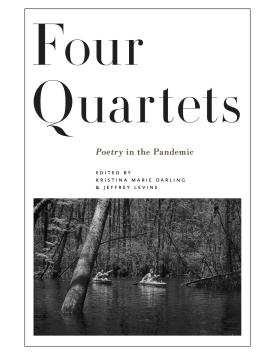 In this timely anthology, established and emerging poets bear powerful witness to the COVID-19 pandemic in writing that reels from collective grief and uncertainty. This volume consists of sixteen separate chapbooks, and a collection of pandemic-era photography, which are unified by a shared narrative: public and private experiences of quarantine, and the impulse toward creation during a time of enormous upheaval, injustice, and protest.
In this timely anthology, established and emerging poets bear powerful witness to the COVID-19 pandemic in writing that reels from collective grief and uncertainty. This volume consists of sixteen separate chapbooks, and a collection of pandemic-era photography, which are unified by a shared narrative: public and private experiences of quarantine, and the impulse toward creation during a time of enormous upheaval, injustice, and protest.
Each voice brings with it a deeply personal account of this globally historic moment, and in doing so, conveys the urgency of introspection, of isolation, and of revolution.
These pieces feature B. A. Van Sise, Jimmy Santiago Baca, Yusef Komunyakaa, Laren McClung, Stephanie Strickland, Mary Jo Bang, Shane McCrae, Ken Chen, J. Mae Barizo, Dora Malech, Jon Davis, Lee Young-Ju, Jae Kim, Rachel Eliza Griffiths, A. Van Jordan, Maggie Queeney, Traci Brimhall, Brynn Saito, Denise Duhamel, and Rick Barot.
Kristina Marie Darling is the author of over twenty books of poetry. Her awards include two Yaddo residencies and a Hawthornden Castle Fellowship, as well as grants from the Whiting Foundation and Harvard University’s Kittredge Fund. She has twice been appointed as a Visiting Artist at the American Academy in Rome. Her poems and essays appear in The Gettysburg Review, New American Writing, The Mid-American Review, Third Coast, The Columbia Poetry Review, Verse Daily, and elsewhere.
Four Quartets: Poetry in the Pandemic
by Kristina Marie Darling & Jeffrey Levine
Publisher: Tupelo Press (November 25, 2020)
Language: English
296 pages
ISBN-10: 1946482455
ISBN-13: 978-1946482457
Paperback $25.95
Hardcover $39.95
• fleursdumal.nl magazine
More in: #Editors Choice Archiv, #More Poetry Archives, Archive C-D, Archive C-D, Archive K-L, Archive K-L
À la fin des années 50, dans la région de l’Aurès en Algérie, Naja élève seule ses trois filles depuis que son mari Saïd a été recruté pour travailler en France.
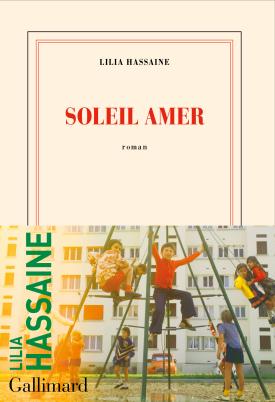 Quelques années plus tard, devenu ouvrier spécialisé, il parvient à faire venir sa famille en région parisienne. Naja tombe enceinte, mais leurs conditions de vie ne permettent pas au couple d’envisager de garder l’enfant…
Quelques années plus tard, devenu ouvrier spécialisé, il parvient à faire venir sa famille en région parisienne. Naja tombe enceinte, mais leurs conditions de vie ne permettent pas au couple d’envisager de garder l’enfant…
Avec ce second roman, Lilia Hassaine aborde la question de l’intégration des populations algériennes dans la société française entre le début des années 60 et la fin des années 80. De l’âge d’or des cités HLM à leur abandon progressif, c’est une période charnière qu’elle dépeint d’un trait. Une histoire intense, portée par des personnages féminins flamboyants.
Lilia Hassaine
Soleil amer
Collection Blanche, Gallimard
Parution : 19-08-2021
160 pages, 140 x 205 mm
Genre : Romans et récits
Littérature française
ISBN : 9782072952173
Code distributeur : G05672
Livre imprimé €16,90
• fleursdumal.nl magazine
More in: - Book News, - Bookstores, Archive G-H
Joanna Klink‘s fifth book begins with poems of personal loss–a tree ripped out by a windstorm, a friendship broken off after decades, the nearing death of parents.
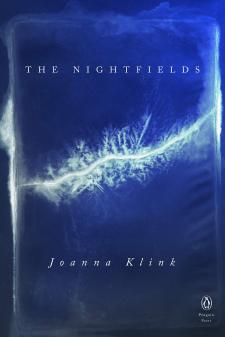 Other poems take on the cost of not loving fully, or are written from bewilderment at the accumulation of losses and at the mercilessness of having, as one ages, to rule things out. There are elegies for friends, and a group of devotional poems.
Other poems take on the cost of not loving fully, or are written from bewilderment at the accumulation of losses and at the mercilessness of having, as one ages, to rule things out. There are elegies for friends, and a group of devotional poems.
The Nightfields closes with thirty-one metaphysical poems inspired by the artist James Turrell’s Roden Crater, an extinct volcano in Arizona that Turrell has been transforming into an observatory for the perception of time. The sequence unfolds as a series of revelations that begin in psychic fear and move gradually toward the possibility of infinitude and connection.
Joanna Klink is the author of five books of poetry. She has received awards and fellowships from the Rona Jaffe Foundation, Jeannette Haien Ballard, Civitella Ranieri, the Bogliasco Foundation, the American Academy of Arts and Letters, the Trust of Amy Lowell, and the John Simon Guggenheim Memorial Foundation. She is teaching at the Michener Center in Austin. Her most recent book, The Nightfields, was published July 7, 2020 by Penguin Books.
( . . . )
When the wind pushes
branches in and out of
shade it is an opening,
as every small gesture
toward another person is
incomprehensibly alive.
Will you be part of the
stoneless passage?
( . . . )
A new collection from a poet whose books “are an amazing experience: harrowing, ravishing, essential, unstoppable” (Louise Glück)
The Nightfields
by Joanna Klink (Author)
Publisher: Penguin Books
July 7, 2020
Language: English
Paperback: 112 pages
ISBN-10: 0143135392
ISBN-13: 978-0143135395
Price: $20.00
• fleursdumal.nl magazine
More in: #Editors Choice Archiv, - Book News, - Bookstores, Archive K-L, Archive K-L
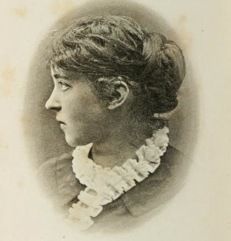
Évolutions
Où sont-ils disparus, les Peuples innombrables,
Autrefois échappés des gouffres du néant.
Pareils aux légions dévorées par les sables
Que la vague dépose au bord de l’Océan ?
Un jour, ils sont venus en conquérants superbes,
Ils ont soumis le globe, ils ont régné sur lui ;
Puis un seul coup de faux qui tranchait le champ d’herbes
Les a plongés soudain dans l’éternelle nuit.
On a vu s’écrouler, leurs pouvoirs séculaires,
Babylone, Ninive, et Thèbes et Memphis ;
Ces cités n’ont laissé que débris éphémères,
Témoins inanimés, argile enseveli.
Dans ces lieux aujourd’hui, vastes déserts stériles,
S’étalaient les splendeurs d’un luxe raffiné.
Et le peuple joyeux qui remplissait les villes
A l’immortalité se croyait destiné.
Il n’a fallu qu’un jour et peut-être qu’une heure
Pour renverser leurs murs, leurs temples et leurs dieux,
Pour faire des palais somptueux la demeure
Des serpents du désert et des oiseaux des cieux.
D’autres ont succédé, rescapés des naufrages ;
D’autres ont recueilli leurs vestiges divers.
Ruines disséminées sur l’Océan des âges,
Épaves d’un vaisseau gisant au fond des mers.
Alors, Art et Science ont entr’ouvert leurs ailes
Comme un aigle superbe au vol capricieux ;
Ils se sont envolés dans des contrées nouvelles
Pour y refaire un nid sous l’éclat d’autres cieux.
Ce fut d’abord l’Asie où l’histoire du monde
Naît sous les verts bosquets de la terre d’Éden,
L’Asie, astre éclatant perçant la nuit profonde
Tel le soleil levant dans l’ombre du matin.
Avec elle l’Afrique et la fertile Égypte
Où le Nil apparaît comme un dieu bienfaisant,
Thèbes et sa nécropole énorme, sombre crypte
D’où les morts assemblés regardaient le présent.
Ils choisirent après, l’Europe, l’Italie,
Ce pays mollement bercé par les flots bleus,
Où, dans le vague écho d’une plainte affaiblie,
L’onde vient expirer sur le sable onduleux.
L’Italie, où semblable à quelque pierre fine
Enchâssée au milieu d’un écrin précieux,
Rome, que soutenait la volonté divine,
Des peuples étonnés éblouissait les yeux.
Elle-même à son tour fut prise et renversée ;
Elle a vu se ternir sa gloire et sa splendeur ;
Ce qu’il reste en ce jour de sa beauté passée
N’est qu’un lointain reflet de sa vieille grandeur.
Puis ce fut tout le Nord de l’Europe ignorée
Qui devint le séjour du savoir et des arts ;
C’est elle maintenant la première contrée,
Et les hommes sur elle attachent leurs regards.
Jusqu’à quand ? — Nul ne sait. Il est un Nouveau Monde
Au-delà des grands flots qui s’accroît jour par jour ;
Sa frontière est immense et sa terre est féconde,
L’Amérique, peut-être, aura demain son tour.
Puis elle passera. — Quelle terre lointaine
Recevra le dépôt par d’autres égaré ?
Dans quelle région, chez quelle race humaine
Luiront encor les feux de ce flambeau sacré ?
Oui ! dans quelque mille ans, dans moins longtemps peut-être,
Où seront nos palais, nos empires, nos lois ? —
Le Temps, ce niveleur farouche, ce grand maître,
Aura tout transformé pour la centième fois.
Et nos belles cités dont nous nous faisons gloire,
Où devaient à toujours se succéder nos fils,
Ne seront plus qu’un rêve à la triste mémoire,
Comme vous, ô Ninive, ô Thèbes, ô Memphis !
Bevaix, 28 août 1882
Alice De Chambrier
(1861-1882)
Évolutions
• fleursdumal.nl magazine
More in: Alice De Chambrier, Archive C-D, Archive C-D, Chambrier, Alice De

Just A Woman
You ask me why I love her;
Not a charm can you discover!
Would you see
The heart that a shut rose is,
And whose beauty ne’er uncloses
Save for me?
She is not rich or clever,
But her speeches thrill me ever,
And with bliss
My heart her whisper flutters,
Though the wisest word she utters
Is a kiss.
All evil things have shunned her,
And with a wide-eyed wonder
Is she tasked,
What lavish god has given
In her earth so much of heaven
All unasked?
She has no gifts or graces,
But the gladness in her face is
Sought of kings;
She cannot chant a measure,
But her heart with a grave pleasure
Ever sings.
Her gown is of the whitest
But the hem is soiled the slightest:
Little worth,
She has no wings to fly with,
And she prefers to hie with
Me on earth.
There is no hint of heaven
Or glimpse of deep thought even
In her eyes;
She is warm and she is human,
Just a weak and wilful woman —
Not too wise.
Her thousand beauties singing,
I have not said how clinging
Are her arms;
But, not loved and not the lover
Dare you ever hope discover
Half her charms?
Arthur Adams
(1872-1936)
Just A Woman
• fleursdumal.nl magazine
More in: Adams, Arthur, Archive A-B, Archive A-B, THEATRE
Thank you for reading Fleurs du Mal - magazine for art & literature